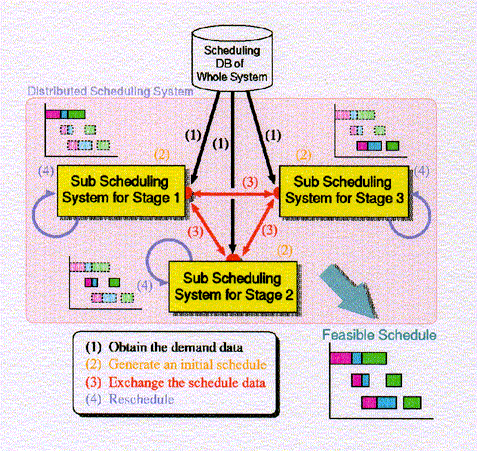
"A Supporting System for Evaluation and Review of Business Process through Activity-Based Approach", Proc. of 7th Int.Symp. on Process Systems Engineering (Denver, July, 2000). (pdf file 386KB)
Multi-Agent Oriented Manufacturing System
ADMS is considered as a practical resolution to achieve better flexibility and productivity in a new paradigm known as intelligent manufacturing system. By noticing a variety of objects such as robots, AGVs, machine tools and jobs can compose autonomous agents in ADMS, this study aims at developing effective cooperation and niche strategies among groups and each of agents, adaptive learning mechanism against the changes of production environment, and much more.
Autonomous Distributed Scheduling System
Since production instructions are usually given to each production stage consisting of more than one unit, each stage is to accumulate enough information and knowledge about its operation necessary for creating a schedule of its own. Therefore, a scheduling system with better adaptability to various changes can be derived more quickly if schedules could be created on the stage-by-stage basis. Then as shown in the figure, we develop a distributed scheduling system that requires no supervisory control system managing the creation of a whole schedule. Instead of it, each production stage will revise its own schedule autonomously toward the goal through communication to other stages.
Design and Control of Discrete Event System Using Petri Nets

We can model many production systems including chemical batch processes as discrete event systems. For the design and control of such systems, we focus on the Petri net that can provide a graphical tool and a mathematical basis for the development at the same time. By using Petri nets, we concern with the studies in terms of modeling, sequence logic validation, and simulation/evaluation of sequence control systems for responsive production.
- "A Colored Petri Net Model for Analyzing Batch Sequential Control System", Proc. PSEASIA 2000, PS-36,pp.279-284, Kyoto, JPN (2000)(pdf file 210KB)
Recipe Engineering of Batch Processing
Standard known as "ISA S-88" has already equipped with hierarchical data structure of production recipe for chemical batch processes. However, any methodology has not given regarding the recipe management, e.g., how to derive actual sequence control programs and some instruction to a plant operator (a control recipe) from a master recipe. Associated with such problems, this study develops a reasonable data-handling method in batch control systems, which needs recipe information for their own production activities, such as production planning, scheduling, batch management and recipe management.
(sc-wm@
 )
)